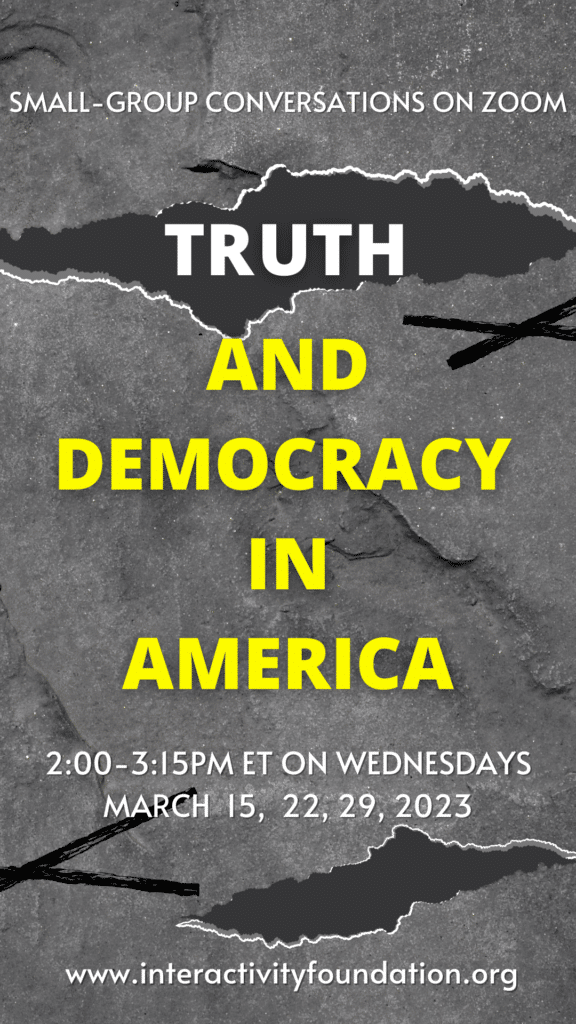
In this first session of our small-group conversation series about Truth & Democracy in America, citizens from around the country gathered online via Zoom for an exploratory discussion of several key questions about the news media, truth, and democracy. Below is a summary of the different ideas and common themes that emerged from each small-group’s discussion.
Join us for the second discussion in this 3-part series, which will be held this Wednesday, March 22nd, at 2:00 pm ET, and will focus on exploring ideas about science, truth, and democracy. You can register for it HERE.
Discussion Summary
What roles do the news media play in connecting truth and democracy? Why is truth important for a healthy democracy?
- As truthful information, news provides a firm ground for decisions. We need shared, truthful information to make rational decisions. It is helpful or even necessary to get multiple and different perspectives, including foreign news
- “Can’t be a citizen without being informed.” Without truthful news, we wouldn’t know what’s going on at all. How would we make choices?
- Biased or false information perverts our democracy; destroys it
- We can’t afford to be wrong. For big issues, a democracy absolutely must have more truthful information in order to make informed decisions. We need to fully understand the motivations, the arguments, the reasoning, etc.
- Truth is essential – there is no such thing as a harmless lie (they are all harmful).
What are some of the challenges facing our news media, truth, and democracy?
Challenges and concerns with journalism and the news media, including its producers, distributors, and platforms
- Oversimplification of complex realities
- Preset narrative structures with a binary presentation that ignores the middle
- Funding model: news that depends upon ratings or views to survive is forced to use spectacle, fear, extremes, conflict, and clickbait to keep people invested or hooked and to compete in a saturated marketplace
- “Fast news,” like other fast industries, is cheap and low quality and changes quickly
- Decline of local news (both newspapers and local broadcast) deprives us of needed information for local decisions that most directly engages and affects us.
- Focusing news primarily or only on national issues weakens the connection between public affairs and citizens, increases our alienation and the sense that some remote “others” are doing things over which we have little or no control
- Many news outlets are working so hard to avoid the appearance of bias (“both-siderism”) that they actually end up hiding or distorting the truth
- Faux news: there is a lot of media that presents as news but is really really news
- Decline of journalism overall and its ability to perform multiple types of reporting: e.g., watchdog, oversight, and investigative journalism; providing public information (meetings, elections); interpretation – analysis and context; as well as commentary and opinion.
- “Democratization” of the news and de-professionalization of journalism:
- Anyone and everyone with an opinion can now be–and often is– a news source, whether or not–and mostly not–they practice journalism
- There too many news sources to choose from, we are overwhelmed by the amount of news available
- declining journalistic standards, blurring the line between straight reporting and opinion/commentary feeds rising cynicism;
- citizens give up following or believing in the news and our democracy.
- However, the news media and its challenges are not “monolithic”–there is still lots of good journalism being done; the challenge is to find and elevate it
Some challenges and concerns about social media more specifically
- Foreign powers have figured out how to use social media to influence elections. This is a direct threat to democracy
- No distinction between information vs. the news vs. opinions
- Influencers have political agendas
- Information can be weaponized to scare people and manipulate them (e.g., to make money off them)
- Social media is not journalism
- Differences in how we may–or may not have–access to and/or choose to use social media
Broader societal challenges & concerns for the public and our democracy
- Increasing polarization – people have different news “bubbles” that fit their beliefs
- Our individualistic and market-oriented approach to the news degrades any sense of an objective truth.
- The challenge of discerning the truth from overarching and often simplistic narratives that can obscure more complex realities
- The challenge of getting people actually to look critically at the evidence; the challenge of changing people’s minds, or arguing with them in a democracy, when they are so willing to believe the opposite of the evidence before their eyes
- Time and attention spans: workers and parents, especially, have little time select from and review multiple sources; follow stories with any depth or detail; and our short attention spans force political leaders and the news media to speak in simplistic slogans
- The challenge of separating facts and factual reporting in our news media from opinion and commentary, especially when public figures and too many news producers constantly lie despite the clear underlying facts.
- Spectacle and fear drive our attention and our consumption of the news
- Decline in mental health because of our news
- Education is behind the curve; we are not educating for media literacy nor an informed citizenry with critical analysis skills
- Generational differences and challenges:
- Older generations used to trust the news media more, but what if that wasn’t justified? What if the news media was often telling untruths and people just assumed it was true (e.g., the Vietnam War)
- Younger generations are increasingly distrustful of the news media; they may bring more critical thinking to bear; seek our more alternative sources, use social media to get first-hand evidence of the facts; and yet still struggle to get an external or objective perspective on events
- Our news media reflects our broken social contract: our news media, truth, and democracy will continue to suffer until we rebuild the broken connection between citizens and democracy–e.g., get rid of gerrymandering, increase ballot access, regulate campaign finance, etc.
What possibilities can we imagine to respond to some of these concerns?
Values, purposes, and re-imagining what news media could mean
- We need to seek truth in all aspects of our life
- Develop and support leaders who hold up the value of truth and model it
- Build community, like this discussion; we need to talk with others and share our thoughts and insights
- Focus on the facts, not the entertainment; but also provide context
- Don’t dumb down the news: do more and better analysis, give specific arguments, numbers, background, context, etc.
- More transparency: every outlet has biases, so it’s better to make them clear, state them up front
- Above all, the news media should be striving to tell the truth and make it easier for people to understand the truth
- The goal should be to inform the public, lead to a deeper understanding, so that people know what’s going on in society and can make informed policy and electoral choices
- Reimagine the news media to be in service to democracy, not commerce
- View truthful information as a public good and publicly fund it, including–in some way–funding for reporting and news media
- Change the news media format to enable citizens to take action – as opposed to just being frustrated, angry, and scared
Strategies on a personal level
- Look for impartiality and assumptions in the reporting
- Do a cross reference or check; read multiple sources; triangulate information
- Look for longer or deeper reporting
- Examine the sources; examine ownership and the motives; avoid propaganda
- Seek out local news; compare local news reporting to a national outlet
- Consider what others think and what their evidence is
- Seek non mainstream sources; look for international news
- Practice critical analysis and reflection: ask myself, what do they want me to believe and why? Notice when a story is trying to persuade or sell me on something; be aware of how the story is making me feel
- Identify sources that are creating an “us” vs. “them” narrative
- Find trusted experts or pundits who can put news in context– information without context can be harmful
- Primary sources are key; e.g., read or listen to the actual speech of a politician, don’t rely solely on the news media’s simplistic summary
Strategies on a societal level
- Increase accountability: make people or companies accountable for disinformation; also, individuals need to see truth-seeking as a basic civic responsibility
- Regulate–consider, for example–
- Enacting an updated “fairness doctrine” policies (requiring some coverage of matters of public interest, including contrasting views); and/or
- Caps on media ownership–the percentage owned by a single entity within a given market
- Non-partisan public funding: if the news media is a public good for a democracy, we should have some form of public funding to support it in a way that is buffered from partisan interests–both commercial and political
- Find a way to fund and restore local news coverage
- Use technology to check sources and cross reference. Use technology, like AI, to help us sort through the mis/disinformation
- Educate for critical thinking skills and media literacy from elementary school onward; educate citizens about logical fallacies, confirmation bias, the difference between opinion/commentary and straight news reporting.


